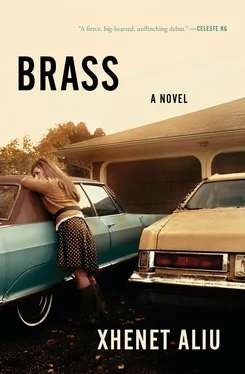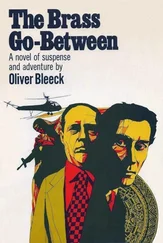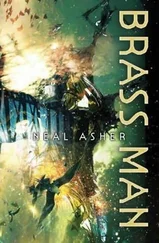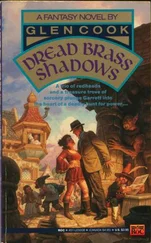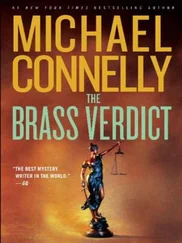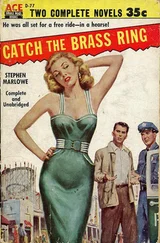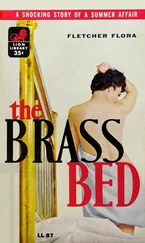“I could give you some money for gas,” you say, crinkling the last twenty in your pocket against your thigh, not really ready to let it go.
“Eh, keep it, Samantha. We were going to be driving this way with you or without you,” she says. You thank her and that’s that. That’s how fast a story can start and end. And then you’re at the end of a street that you’d traveled nearly two thousand miles to find, and you wonder if stories ever really start or end.
—
You don’t know why you weren’t expecting what you see. You imagined your father’s family in one of those big cul-de-sac behemoths with a pull-around driveway, a wraparound porch, and an interior that had never met a beige it didn’t like. After all, he’s a businessman, a pizza scion, maybe not quite Papa John but an entrepreneur nonetheless. He escaped both Communism and the gray-and-rust part of New England that didn’t have Sherwin-Williams paint colors named after its towns, so he has to be a man of some means in order to make it as far as he has. But you quadruple-check the address, and there is no pull-around driveway, or a second or third floor, or a wraparound porch, or a porch at all, unless you count the three concrete slabs that lead to the front door. It isn’t that it’s awful. It isn’t as bad as Greta’s place, it doesn’t share walls or floors with anyone like at your place, there are no discarded Reeboks tangled up in the telephone wires outside. It isn’t awful because it isn’t anything, just a little rectangle like the one Mamie lives in, something that looks like what second graders draw when signifying house. It has four walls covered in yellow vinyl siding with black shutters and a chain-link fence, which keeps a yappy little Bichon Frise in and strangers like you out.
Strangers like you. That’s what you are, as the barking little dog warns its masters inside.
This is the part where you’re supposed to hesitate. Everything before this point has been rising action, and this is either the climax or the point where everything falls apart. For it being one of the oldest stories in the book—at least the YA books you so loved when you were far more young than adult, those pages of wayward parents and lonely, precocious, tough-as-nails daughters who talk like teenage girls never talk—you have no foresight into how this will end. It’s here that either you will be initiated into an entirely new family, which will mean you’ll be loved and hurt and protected and betrayed exponentially more than you have ever experienced; or you will learn for certain that you’re a thing to be shunned and rejected, unlovable by vampire or werewolf, your own father and siblings, and, if you go ahead and complete the betrayal by knocking on the door, even your own mother, once and for all. You know that the apprehension a reasonable person would have felt two weeks ago, when the seeds of this maniacal idea had been planted, should surely be occurring to you now.
But dear god, do you have to pee, and you really want that nippy asshole Bichon Frise off your ankles. So you knock three times, before you have a chance to think any better of it, and the hesitation that follows isn’t on your side of the door. You hear some low talking, and some louder talking, and then a series of dead bolts being unlocked. There’s the sound of something stuck, a metal jiggling or something, but as the door opens you realize that the sound isn’t a sound but a feeling, and that the feeling is that of your heart shaking loose in your chest. Standing before you is a woman with her hand over her own heart, so whatever condition you’ve suddenly been afflicted with is obviously contagious. Neither of you says a word, but she opens the door wider to let you in, and two small children rush over to the woman’s side.
“It’s her,” the younger one, a girl, says. She’s about eight years old, her thick hair in a side ponytail, and she looks at you with a mixture of fascination and fear, the way that kids look at things they’ve been told about but have not yet seen, like a body at a wake. The girl’s brother, who’s just a little taller than the girl, keeps a safer distance, his black eyes fixed on you like on a television screen. From somewhere away from the door and the huddled mass of human that’s accumulated there, someone calls out, “Hi.” The source is a buzz-cut kid in a black sweatshirt, his posture as bad as yours. It must be Adnan, that oldest son, that legitimate firstborn.
There’s someone sitting next to him at the table, too, her hands wrapped around a teacup that has to be close to shattering under her grip.
“Mom?” you ask. It comes out as a question because despite what you’re seeing, it’s impossible that she’s there. But then again, it seems impossible that you’re there, too.
I couldn’t tell if it was nerves or childbirth that unsteadied my legs as I walked the staircase, but I took the steps one at a time as I climbed down, first one foot on the plank and then the next one landing right beside it, the way toddlers do. My free hand clung to the rail for support until I changed my mind and held the baby to my chest with both hands instead of one, then switched back again, not knowing which would keep us safer. Eighteen steps later and we were on the landing, both of us okay for now, even though I worried about crushing her in my arms, which were holding her too tightly. I tried to loosen my clutch around her but I couldn’t. I was too afraid of losing her. Even off the stairs, I walked a pace at a time, one foot meeting the other ahead of it like a bride walking down the aisle. A bride in heather-gray sweats, dyed pink with blood.
The radio was on, a stream of talk radio raging about war or taxes or traffic, something to get Yllka’s heart pumping before the Turkish coffee kicked in. It was barely dawn, and I imagined the shuffle of her slippers over the linoleum floor. I knocked once, but didn’t hear any footsteps move toward me, so I knocked again, and again, until finally I opened the door and let myself in.
“Yllka,” I said.
She whipped around and dropped the bucket of sudsy water she was holding in her hands. “Punë muti!” she shrieked and pressed a wet hand against her heart. “Elsie, you scared me,” she said. She squinted through the fuzzy bangs covering her eyes, then pushed them out of the way. “Elsie? Elsie, Elsie,” she repeated and dropped the sponge that was in her other hand.
Yllka looked at us, me and the baby, hand to her mouth, eyes wide with horror. Suds dripped from her fingertips as if she bled cleanliness, and could just wash over us with it, but she held her arms close to her, cradling herself.
“I didn’t know she was coming,” I said.
“Oh my god,” she said.
“I didn’t know until it was too late. I couldn’t move.”
“You…Oh, Elsie…You didn’t know she was coming? Oh, oh, oh.” She touched a fingertip to the baby, to my shoulder, feeling us out, making sure we weren’t a bad dream. “Oh, this is bad, Elsie. How could you not know? Oh, never mind, you need to go to a hospital. Oh, oh, oh. Oh god, and Bashkim! Sit, go sit down!”
“We should go,” I said.
“Go? Where do you want to go?”
“The hospital.”
“Yes, of course the hospital. Here,” she said, as if about to hand me something, but instead dropped down into the seat beside me, collected herself, and when she rose, she was again the woman I was anxious and terrified to come to.
“Okay, you have cleaned the mouth?” she asked. “She has cried? You have fed her?”
“She has cried. I haven’t fed her. She’s been asleep,” I said.
“She’s moving, though? She’s breathing?”
I could feel her warm shallow breath against the nook of my arm, where she was cradled, stretching a limb sometimes, and opening her mouth like a bass out of water, silently gasping for something. “She’s breathing,” I said.
Читать дальше
